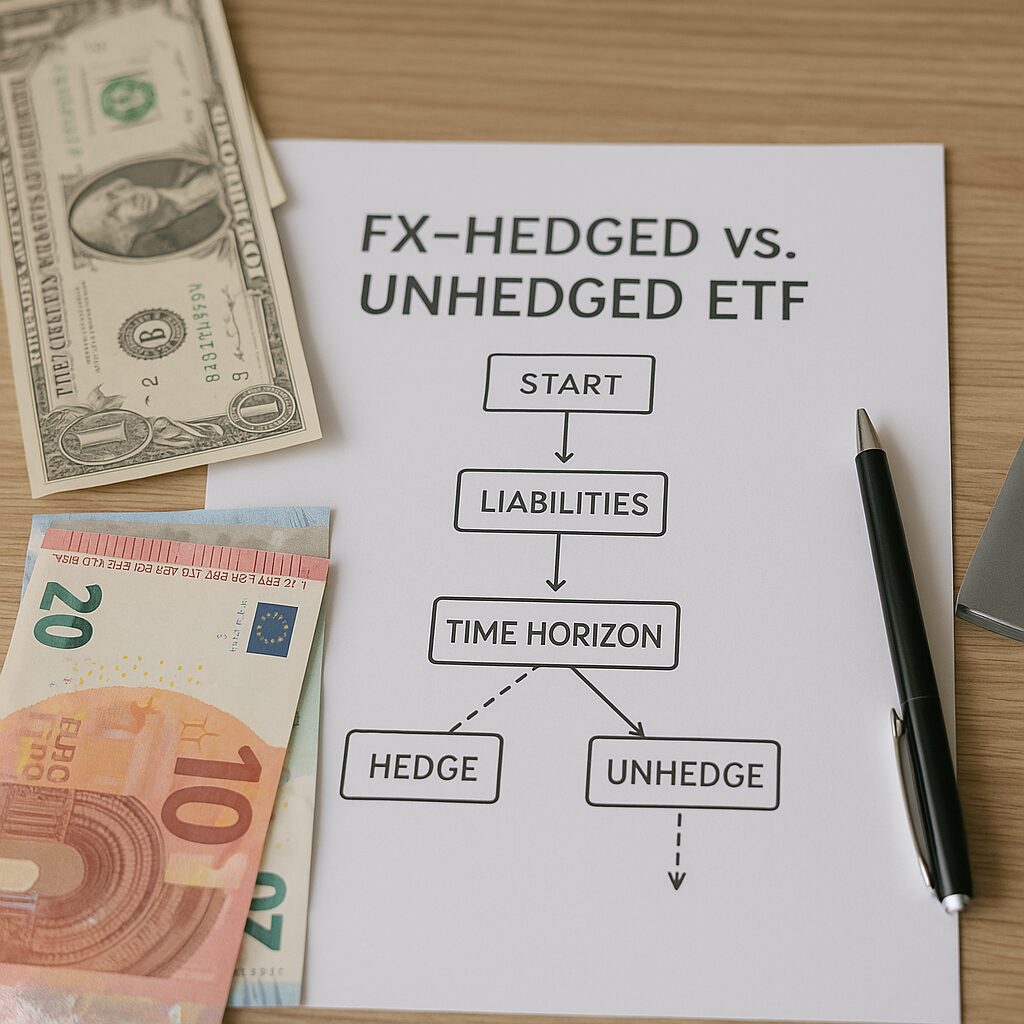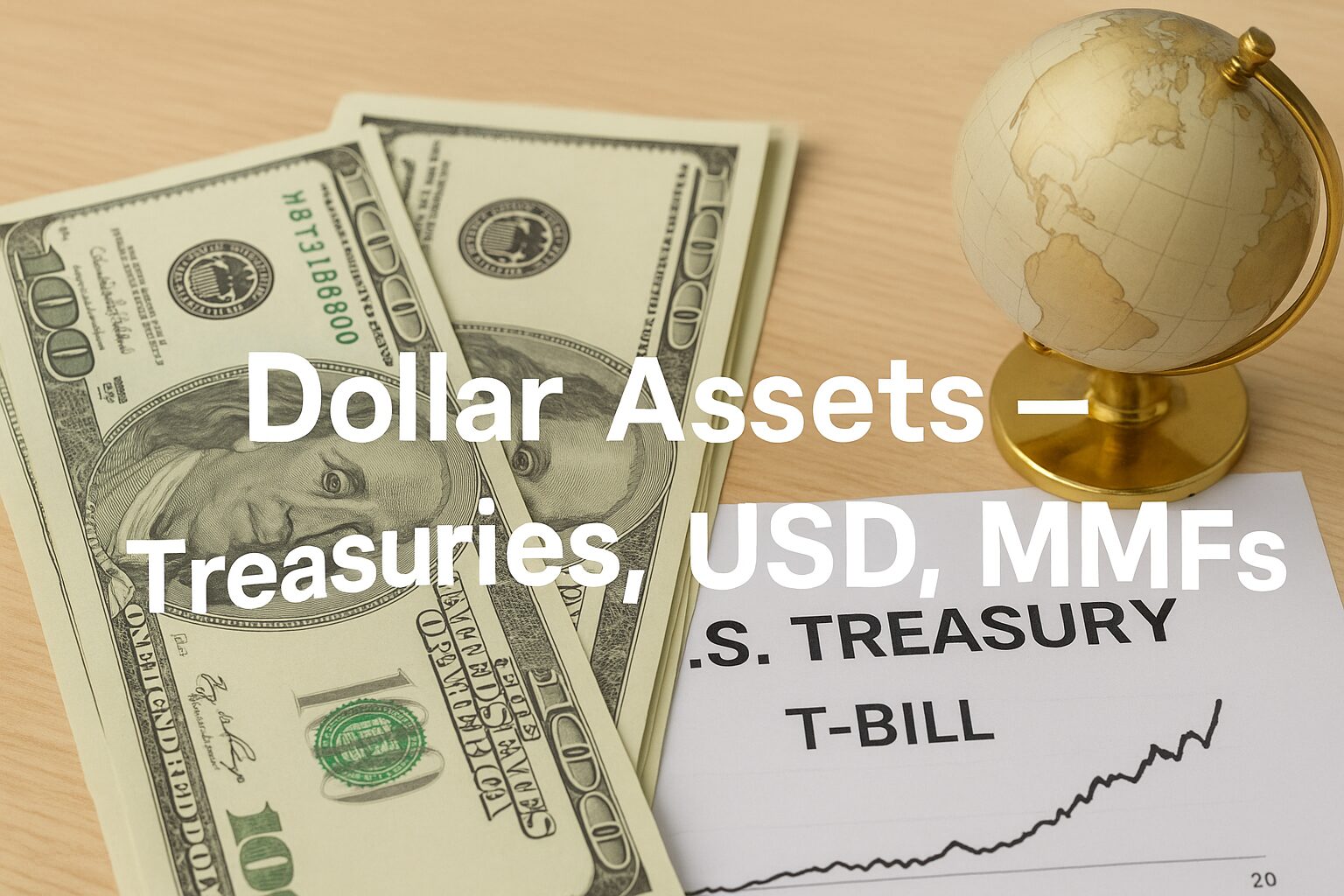FX-Hedged vs. Non-Hedged ETFs — Stop Letting Currencies Steal Your Returns
How to use this guide: This is a practical playbook. You’ll leave with a copy-paste decision tree, simple math to diagnose what FX is doing to your performance, and rules for when to hedge, how much to hedge, and how to maintain it without guessing. At the bottom: an English Case List you can skim at every rebalance, followed by a must-read next-article preview.
1) The Only Three Questions That Matter
- What currency are your future expenses and liabilities in?
- What currency do the ETF’s underlying assets earn in?
- What is the cost and reliability of hedging for your instrument?
If you answer these honestly, the hedged vs. unhedged decision becomes mechanical instead of emotional.
2) The Return Decomposition You’ll Actually Use
Your base-currency return from a foreign ETF ≈
Local Asset Return × FX Change (plus fees/tracking/withholding).
A quick way to think:
- If the foreign currency strengthens vs. your base, unhedged positions get a tailwind.
- If it weakens, unhedged positions suffer even when locals rallied.
- Hedging removes most of this FX noise, leaving you with the local asset result minus hedge costs and slippage.
Write this into your tracker:
- Local return
- FX movement vs. base
- Hedge cost/roll (if hedged)
- Tracking difference
3) When Hedging Usually Makes Sense (and When It Doesn’t)
Hedge-friendly situations
- Short/medium horizon liabilities in your home currency (tuition, living costs, down payment).
- Bond ETFs (especially high-grade): FX volatility can dwarf the asset’s yield; hedging often stabilizes the intended “safe” sleeve.
- FX dominates your experience: you find yourself reacting to currency swings more than fundamentals.
Hedge-resistant situations
- Very long horizons and equities: currencies tend to mean-revert while corporate earnings partially adapt (pricing power, global revenue).
- Natural FX matching: your future spending or planned relocation is in the same currency as the asset.
- High hedge cost or poor instruments: wide spreads, roll cost, or products that don’t track well.
4) Costs and Frictions You Must Log
- Forward/roll cost (or gain): often tied to interest-rate differentials; can flip sign over time.
- Instrument slippage: hedged share classes/ETFs vary in tracking discipline.
- Operational drag: rebalances, distributions, and cash flows can create small mismatches.
- Tax treatment: distributions vs. accumulations and the domicile of the share class can alter after-tax compounding.
Rule: Treat hedging as a position with its own P&L and rules, not a free toggle.
5) The Copy-Paste Decision Tree (print this)
Step 1 — Identify base currency and liabilities
- My spending/obligations in the next __ years are mostly in: __.
- If same as the ETF’s asset currency → hedging optional, go to Step 3.
- If different → go to Step 2.
Step 2 — Time horizon & asset class
- Bonds or income-sleeves with stability goal → HEDGE by default.
- Equities with a horizon beyond __ years → UNHEDGED by default unless FX dominates your behavior.
Step 3 — Hedge cost & product quality
- Estimated annual hedge cost/benefit: __%
- Liquidity/spreads acceptable? Yes/No
- If cost is low and instruments are solid → hedging viable. If not, favor unhedged or partial.
Step 4 — Choose hedge ratio
- If liabilities are fully domestic and you can’t tolerate FX noise → 50–100% hedge.
- If liabilities are mixed/uncertain → 25–50% partial hedge.
- If liabilities are foreign (you’ll spend in the asset currency) → 0% hedge.
Step 5 — Maintenance rules
- Rebalance hedge quarterly or when FX moves more than __% from last set point.
- Cap hedge adjustments to once per week.
- Document roll and tracking; if either degrades, reassess.
6) How Much to Hedge? (position-sizing you can live with)
Simple framework
- 0%: very long-term equities, liabilities in asset currency, or hedge products are poor.
- 25–50%: “behavioral buffer” — reduces regret and keeps you invested while maintaining some upside from favorable FX.
- 75–100%: liability-matching (near-term expenses in base currency, bond sleeves, capital preservation goals).
Behavioral truth: Partial hedges keep investors in the game. If FX pain makes you abandon a good asset, a 50% hedge can be the difference between compounding and capitulating.
7) Choosing the Vehicle (don’t overcomplicate)
Option A — Hedged share class of the ETF
- Pro: One line item; clean.
- Con: You’re tied to the provider’s hedge quality.
Option B — Separate currency-hedge ETF or overlay
- Pro: Adjustable hedge ratio without touching the asset.
- Con: Two moving parts; you must rebalance both.
Option C — Direct forwards (if available)
- Pro: Precise, potentially efficient for size.
- Con: Operational complexity and roll work.
Checklist before funding
- Liquidity in both the asset ETF and the hedge vehicle.
- Clear distribution policy and tax handling.
- Transparent methodology for the hedge (frequency, instruments, target).
8) Dynamic Rules That Don’t Turn Into Day-Trading
Band-based FX rule
- Establish a target hedge ratio (e.g., 50%).
- Adjust only when the base currency moves beyond ±__% against the asset currency from your last set point.
- Move in tranches (e.g., 10–15% increments).
Stress brake
- If FX volatility index or realized volatility exceeds your threshold, pause increases to the hedge until the next scheduled review.
- Never raise hedge ratio during a panic candle; wait for your calendar point.
Calendar discipline
- Primary review monthly; structural review quarterly (re-check costs, tracking, tax).
9) Equity vs. Bond ETFs — Treat Them Differently
Equity sleeves
- Long horizons and global revenue bases often dilute pure FX risk over time.
- Hedging can mute diversification benefits if your home currency tends to weaken when global risk is on.
Bond sleeves
- Yield is modest; FX volatility can swamp it.
- If your intent is “stable ballast,” hedging usually restores the purpose of the sleeve.
Rule of thumb to write down
- Hedge bonds, consider hedging equity selectively, never hedge everything by habit.
10) Integrating With Your Core + Barbell (from Parts 1–2)
- Keep your three-ETF core and sector barbell unchanged; lay hedges on top.
- Apply hedges at the sleeve level (e.g., EM equity sleeve: 0–50% hedge depending on rules; core developed-equity sleeve: 0–25% hedge).
- When you add defensive sectors for stability, avoid double-stabilizing with aggressive FX hedges that eliminate all natural offsets.
11) The FX Journal (your one-page control center)
Maintain a single page with:
- Base currency and any foreign spending plans.
- Current hedge ratios by sleeve.
- Last adjustment date and FX level.
- Estimated annual hedge cost/benefit.
- Next scheduled review date.
- Notes: “no action” logs count.
If you can’t keep this page current, your hedge is too complex.
12) Copy-Paste Templates
A) Policy Snippet (drop into your Investment Note)
- Equity sleeves: default unhedged beyond -year horizon unless FX volatility exceeds __ over __ days; then raise hedge to **%** in __% tranches.
- Bond sleeves: default hedged –%; adjust only at quarterly reviews.
- Hedge ratio bands: ±__% around target; maximum one change per week.
- Cost guardrail: if annualized hedge cost > %, reduce hedge by **%** unless liabilities require protection.
- Composite cap: total hedge not to exceed __% of portfolio MV.
B) Rebalance Checklist (monthly)
- FX move vs. last set point: __%
- Hedge ratio vs. band: inside / breach
- Roll cost/tracking check: pass/fail
- Action: increase/decrease/none
- Funding source: dividends/cash buffer/rebalance
- Log entry created
C) Partial-Hedge Play (behavioral)
- Start at 25–50% on foreign equity sleeves.
- Increase in 10–15% tranches only when bands trigger.
- Decrease back to default when FX mean-reverts into band.
13) Real-World Traps and Fixes
- Hedging the wrong thing: people hedge total portfolio not the sleeve.
Fix: hedge where the FX exposure lives. - Product mismatch: thin hedged share class with wide spreads erases benefits.
Fix: size to liquidity; pick robust vehicles. - Overhedging bonds + equities simultaneously: kills natural offsets.
Fix: prioritize hedge on the income sleeve; keep equity hedges partial. - Changing hedge by headlines: adds cost without benefit.
Fix: calendar + bands; one change per week max. - Ignoring taxes: wrong domicile/share class reduces after-tax compounding.
Fix: document distribution type and treaty effects before funding.
14) Maintenance Dashboard (add to the tracker you built in Part 1)
- Hedge ratios by sleeve vs. targets and bands.
- FX move since last set point.
- Estimated annual hedge cost.
- Tracking difference of hedged vehicles.
- Actions taken / “no action.”
- Next review date.
Case List (Quick Reference)
- Case A — Tuition Shield: Investor with near-term domestic tuition uses a 100% hedge on foreign bond sleeve; volatility drops and cash flow planning becomes reliable.
- Case B — Behavioral Buffer: Equity investor keeps abandoning EM after FX swings; a 50% partial hedge cuts noise enough to stay invested and capture recovery.
- Case C — Overhedged Core: Investor hedges both equity and bond sleeves to the maximum; portfolio loses natural offsets and feels “heavy.” Reducing equity hedge to 25% restores balance.
- Case D — Product Pitfall: Hedged share class with thin liquidity shows persistent tracking error; switching to a liquid overlay ETF tightens tracking and reduces slippage.
- Case E — Wrong Liability Match: Investor plans to spend abroad but keeps a full domestic hedge; returns chronically lag needs. Removing the hedge aligns assets with future spending currency.
- Case F — Band Discipline Wins: FX whipsaws; because bands weren’t breached, the log reads “no action.” Avoided churn and cost while the currency mean-reverted.
- Case G — Cost Guardrail Trigger: Hedge roll cost spikes above the policy limit; ratio automatically steps down by 10%, preserving after-tax compounding.
- Case H — Bond Sleeve Saved: Unhedged global bond ETF swings more than intended; switching to a hedged bond sleeve restores the ballast role.
- Case I — Panic Candle Avoided: Headline shock tempts a hedge increase; rule requires waiting for the calendar checkpoint, where calmer spreads yield better execution.
- Case J — Clean Exit: FX mean-reverts into band for three monthly checks; hedge ratio steps down in two tranches back to default with minimal slippage.
📌 Next Article Preview (must-read urgency)
Smart Beta & Factor Funds — Do They Work, and Where Do They Fit in Your Stack?
You now control currency risk with rules. Next, you’ll test Quality, Momentum, Value, and Minimum Volatility the way pros do—by role in the system, not by marketing claims.
You’ll get:
- A 20+ year behavior map for each factor: when it carried and when it failed.
- Integration rules so factors complement your core and barbell instead of duplicating risk.
- A DRiP + REIT + factor wiring diagram you can copy.
Skip this and you may pay fees for factors that simply replicate what you already own—without adding resilience or return.









